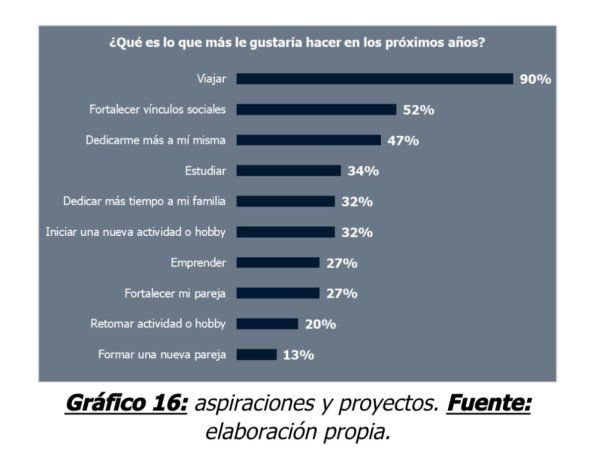70% of women “Silver” acknowledged feeling “completely independent” in the economic aspectaccording to a recent study. However, more than 40% stressed that Care tasks are still frequent In his life. Academic and Human Resources voices highlighted Scope The importance of implementing Strategies for Labor Insertion and questioned that currently female success is represented by the youth.
The study “New female archetype +50. From the mandate to desire: the silent revolution that changes adulthood” of the Social Research Center (CIS) of the UADE He showed that seven out of ten women claimed to feel “completely independent” economically, while 24% feel “partially autonomous.”
However, home tasks remain frequent for 43% of the sample. With 433 surveyed, other data stressed that 60% responded to be participating in physical/body activities and 45% in those of a social or cultural nature.
Given these two main data contrasted, the spokeswoman of the study, Julieta Olivera, pointed in dialogue with Scope that this independence is crossed by the possibility of inserting in the labor market, which enables decision -making of their own will.
The sociologist Agustina Bendersky He highlighted this media the importance of looking for the future, facing the proximity that this age group keeps with access to a retirement. While the director of the consultant Pagegroup Argentina, Martín GerdingHe stressed that both men and women with senior profiles aim to achieve a balance between their life and their work, but it is they who find difficulties in reconciling both worlds.
Work as a door to independence
Consulted about the factors that affect this feeling of economic autonomy, the spokeswoman for the report, and director of the Department of Psychology of the University, Julieta Olivera It was overwhelming: “The most important has to do with the possibility of working “he said and added that this enabled the own decision -making and “not being forced to follow activities that allowed him the husband.”
On the other hand, the sociologist and member of the organization Found Agustina Bendersky considers that this 70% “highlights that it is fundamental designing strategies to guarantee an independent life to older people“, focus on the age factor. For her, although the sample reaches women in the stage prior to the retirement age“It is interesting to see The weight they give to the activities that allow them to have an autonomous life. “
Leadership Employment Employment.jpg
From Pagegroup, many women leaders understand “professional growth as inseparable from personal and collective well -being.”
Gemini
Another fact to highlight is that 63% of the sample indicated to be in dependency or registered relationshipin the age of 50, while the percentage reaches 74% in the case of those who are on their way to 60 years. Regarding these numbers, Bendersky believes that Labor insertion “allows not only their economic autonomy, but also (when they arrive) access a retirement”.
The director of the Human Resources consultant Pagegroup Argentina, Martín GerdingHe commented that senior professional profiles, both in men and women, seek “autonomy, balance between life and work and a leadership that value the trajectory without sacrificing well -being“
But he stressed that in the case of women “many must face salary gaps that condition your projects “ And he added that they see a tendency to “face men to Challenge of reconciling your personal life and constant pressures to demonstrate your competition. “
Although he pointed out that he sees efforts from various organizations and entities to foster diversity and equal opportunities, he emphasizes that “there is a way to go in that regard, starting with Expand female participation in leadership roles“
For gerding, Many leading Argentine women show a “strong commitment to the purpose of the place where they work”, both for your own experience and your teams.
For the director, they understand “professional growth as inseparable from personal and collective well -being”: “Many drive a balance between business evolution, family harmony and individual realization. For them it is not just about achieving results, but about building and enabling spaces for others to grow, “he concluded.
Home tasks: not so important but frequent
On the 43% who see how frequent home tasks, Olivera was sincere: “That number caught our attention because We consider that the one of women is a higher percentage that they perform them. “However, he also stressed that they see” a change “in how those chores are seen, since many surveyed stood out other activities as important for their future far from those related to their family.
UADE STUDY

From the UADE they see “a change” in how those chores are seen, since many respondents highlighted other activities as important.
CIS UADE
“ At another time in history, it would have been difficult for them to admit that they did not occupy much of the time in these tasks. Our mothers and grandmothers considered that it was what corresponded, That the ‘good woman’ was the one who could do them, “said Olivera.
However, the director of Psychology of the UADE points out that it is still far from a 50/50 distribution, since “it will cost us a more time to finish putting together a more even distribution. Perhaps in the next generation we see it a little more advanced.”
On the other hand, the representative of Fundar, and also a magister in gender, society and policies, questioned himself about the informal market: “What about the other women who do not access a registered jobwho are mothers and heads of household, or who care for their grandchildren so that their daughters can work? How do the same possibilities ensure? “
Among the measures he suggested to encourage this independence towards the bulk of society, he mentioned:
- Define a support system to promote autonomy and prevent long -term institutionalization (long -stay residences);
- Strengthen and improve existing infrastructure for the care of older people that promote their autonomy (day and retired centers);
- (Re) Design programs of Collective homes for older people;
- Strengthen the Support system through home care work;
- Expand the provision of services and infrastructure to meet needs earlier.
- Promote the PROFESSIONALIZATION, REGISTRATION AND CERTIFICATION of home caregivers.
The representation of success +50: from home to youth
More than half of surveyed (54%) also pointed out that The representation of women in media is stereotyped with a “high and negative effect”, under the idea of complying with factors such as Youth, beauty and success.
In this regard, the UADE spokeswoman pointed out a great change in contrast to the representation of 50 years ago: “When these women were born or were small, the image was that of one that was at home, she cooked, took care of the children And not much more“
“If we see what happened 20 or 30 years ago, a woman with greater departure began to appear. But today The image of a successful woman of +50 It is the one that protects issues linked to the youth”Olivera contrasted.
Thus, the positive image of this “good woman” that she describes no longer passes through the home but for being “the youngest”: “They sell us creams so that you do not notice age, all the time you are thinking that you would have to aspire to see you younger than you really are, instead of this acceptance,” he said.
Source: Ambito
I am an author and journalist who has worked in the entertainment industry for over a decade. I currently work as a news editor at a major news website, and my focus is on covering the latest trends in entertainment. I also write occasional pieces for other outlets, and have authored two books about the entertainment industry.




